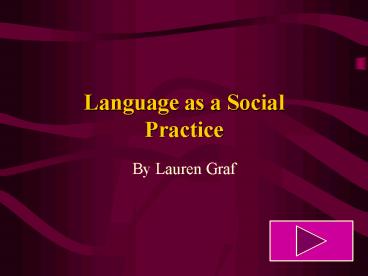Language as a Social Practice - PowerPoint PPT Presentation
1 / 13
Title:
Language as a Social Practice
Description:
Language as a Social. Practice. By Lauren Graf. Introduction. Intro ... This is achieved through discourse communities, socio-cultural approaches and ... – PowerPoint PPT presentation
Number of Views:211
Avg rating:3.0/5.0
Title: Language as a Social Practice
1
Language as a Social Practice
- By Lauren Graf
2
Introduction
- Intro
- Language as a Social Practice which is learnt as
we engage with our families and communities in
socio-cultural activities. This is achieved
through discourse communities, socio-cultural
approaches and these theoretical approaches and
these theoretical approaches being applied to
language and learning in the context of schooling
to enhance a childs literacy and language
development. - Main Themes
- Discourse Communities
- Socio-cultural
- Contexts of schooling
3
Discourse CommunitiesContents
- Topic Sentence ( Slide 4)
- Elaboration Examples ( Slide 5)
- NEXT THEME Socio-cultural approaches
GO TOgt
GO TOgt
4
Discourse CommunitiesTopic Sentence
- Definition
- We learn to do literacy as we are engaged
within discourse communities. - Discourse Communities can be described as,
- a particular language used by different people
in a particular community or or group that share
particular beliefs, values or ideas. (Love et
al.2002,unit 1a,sc13) - Back to Discourse Contents Page
5
Discourse CommunitiesElaboration Examples
- How do we become a member of a Discourse
Community. - Acquisition Process ( Unconscious Learning)
- Learning Process(Conscious Learning0
- Insider (A member of a discourse)
- Outsider ( Unfamiliar with a particular
discourse) - Primary Discourse (Family)
- Secondary Discourse (Schools, University, or
church groups) - Literacy as a control ( Secondary Discourse)
- Examples of Discourse are Men, Women,
Patient,Doctor. - Back ToDiscourse Contents Page
6
Socio-culturalContents
- Topic Sentence (Slide 7)
- Elaboration Examples ( Slide 8)
- NEXT THEME Theoretical Approaches to the context
of schooling
GO TOgt
GO TOgt
7
Socio-culturalTopic Sentence
- Socio-cultural approaches are developed to
enhance a childs language and social
development. Examples of these approaches
include, Zone of Proximal Development,
Scaffolding, Teacher/Learner Cycle and Diagnosis
processes. - Theories by Vygotsky, Bruner,Hammond and Gibson.
- Back ToSocio-cultural contents
8
Socio-cultural approachesElaboration Examples
- Vygotsky (1978) maintained that the child
follows by adults example, refer to ZPD. - ZPDThis refers to the next level in the
learners development.This evolves support in
moving to the next stage. (Love et
al.2002,unit1a,sc36). - ScaffoldingThis refers to someone whom is
expert in a particular skill helping a less
expert person to learn this new
understanding(Love et al.2002,unit1b,sc 28-51) - Micro level Micro level scaffolding
- Teacher/Learner Cycle This refers to the five
key stages in language development.(Love et al.
2002, unit2b,sc1-28) - BACK TO Socio-cultural contents page
9
Theoretical approaches in the context of
schoolingContents
- Topic Sentence (Slide 10)
- Elaboration Examples ( Slide 11)
- NEXT THEME Conclusion
GO TOgt
GO TOgt
10
Theoretical approaches in the context of
schooling Topic Sentence
- Theoretical approaches can be used in the
contexts of schooling to assist the childs
development of literacy and language. For these
theoretical understandings to be successful
within the classroom,teacher strategies have been
developed. Examples of these strategies include
modeling,enabling adult, child diagnosis,
successive approximations,the conventions of the
classroom language opposed to language within the
home,turn-taking,speech roles and the use of
language appropriate to the learner. - BACK TO Theoretical approaches in the contexts
of schooling contents page
11
Theoretical approaches in the context of
schoolingElaboration and Examples
- Modeling
- Enabling Adult
- Socio-cultural Context
- Child Diagnosis
- Successive Approximations
- The conventions of classroom language opposed to
in the home - Turn-taking and Speech Roles
- Teachers use of oral language appropriate to the
students - BACK TO Theoretical Approaches in the contexts
of schooling contents page
12
Conclusion
- In conclusion we learn to do literacy as we are
engaged within our families and communities, this
can be seen through discourse communities and
theoretical approaches such as scaffolding, the
ZPD, the five key stages and the Learner/Teacher
cycle. These theoretical understandings can be
applied to the context of schooling through
strategies such as, modeling, scaffolding,IRF
patterns, student diagnosis, teaching functions
and enabling adults. It is these strategies that
can be used within the context of schooling that
refer the roles of adults in enculturation of
students within our homes and schools. - NEXT THEME Reference
13
Reference
- Love,K, Pigdon,K Baker, G, Hamston, J 2002,
Built Building understandings in Literacy and
Teaching, 2nd Edition, University of Melbourne,
Melbourne. - GO TO Home































